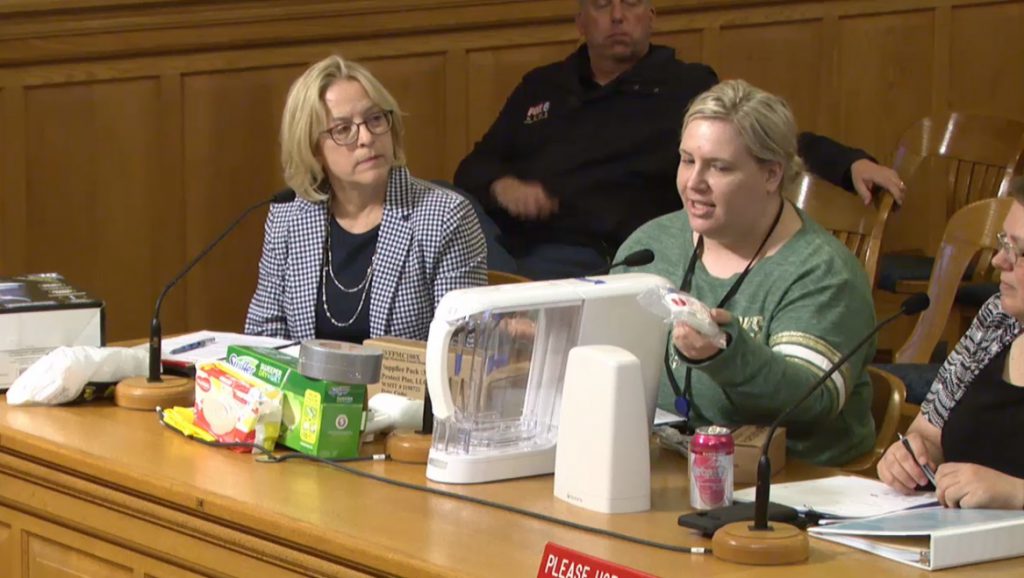Who Can Get a Free Lead Filter?
City departments offer maze of options to get a lead removal water filter. Who's eligible?

MHD employee Jean Schultz highlights the different lead-safe water filters and products to a Common Council committee. Image from City Channel 25.
The City of Milwaukee has given away over 5,000 filters designed to remove lead and other toxins from water since 2016. But how to get one of those free filters can be a bit of a mystery.
The Milwaukee Health Department provides filters to city residents that meet one of a number of criteria. Households in Milwaukee with bottle-fed infants are eligible, as are state licensed or certified child-care facilities. Households with children who have tested positive for blood lead levels in excess of 20 micrograms per deciliter are eligible, regardless of the source of the lead.
The Milwaukee Health Department anticipates providing approximately 2,800 filtration devices this year from its $150,000 budget allocation. The department offers three different filters, all of which must be attached to the sink, according to program manager Jean Schultz.
For the first time, the department will also provide replacement cartridges as well. Households that have already received a filter are eligible for a replacement cartridge.
The replacement cartridges are important, as the filters often lose their effectiveness after six months said Schultz in a presentation to the Common Council’s Public Safety and Health Committee. She said the department provides a one-year supply of cartridges with any filter.
The department distributes filters through its own offices and partner organizations including the Social Development Commission, Sixteenth Street Community Health Center, Department of City Development, Habitat for Humanity, Milwaukee County WIC programs and the city’s Head Start program.
Schultz said filters will also be provided within Lead Safe Home kits that the department distributes.
According to Schultz, those seeking a filter should call 414-286-2165 to determine their eligibility and identify a nearby distribution site.
Construction Work Filters
The health department’s program is one of two programs the city offers. The Milwaukee Water Works (MWW) also provides water pitchers with embedded filters for short-term use.
MWW spokesperson Rosalind Rouse told the committee that it provides lead-safe pitchers in a handful of cases. The first is when a lead service line is being replaced. The city-owned entity recommends using a filter for at least 30 days following the replacement and directly provides a filter to the home. In Madison, which replaced all of its lead laterals, 51 percent of homes still tested positive for lead in their water.
A voucher for a filter, redeemable at a number of Water Works facilities, is provided when a planned or emergency water shutoff affects a property with a lead service line. A voucher is also provided to homes with lead service lines if the city or a contractor is about to rebuild the street or nearby sewer mains where disruption to lead service lines is possible.
The pitchers need a replacement cartridge after 30 days. Customers are eligible to pick up one replacement cartridge.
MWW’s program has been in place since 2017. It is funded by the entity’s operating and maintenance budget. Rouse said the department has negotiated a discount with Aquasana and Kohler to reduce the cost of the pitchers.
Those not eligible for the city programs can purchase a filter from a number of area retailers. Prices vary from approximately $30 for the pitchers to $400 for more extensive filtration systems.
If you think stories like this are important, become a member of Urban Milwaukee and help support real independent journalism. Plus you get some cool added benefits, all detailed here.
Legislation Link - Urban Milwaukee members see direct links to legislation mentioned in this article. Join today
If you think stories like this are important, become a member of Urban Milwaukee and help support real, independent journalism. Plus you get some cool added benefits.
More about the Lead Crisis
- Rep. Madison Proposes Restoring Local Control Over Lead Inspections - State Rep. Darrin Madison - Jan 6th, 2026
- $43 Million Later, MPS Says Classrooms Are Safe From Lead Dust - Corrinne Hess - Dec 18th, 2025
- MPS Buildings Cleared of Lead-Paint Risks after 10-Plus Months of Work - Milwaukee Public Schools - Dec 17th, 2025
- Wisconsin Moves to Require Lead Service Lines Replaced By 2037 - Danielle Kaeding - Dec 11th, 2025
- Gov. Evers, DNR Announce More Than $159 Million to Ensure Clean, Safe Drinking Water for Wisconsinites in 29 Municipalities - Gov. Tony Evers - Dec 10th, 2025
- EPA Announces $3 Billion in New Funding for States to Reduce Lead in Drinking Water - U.S. Environmental Protection Agency - Nov 25th, 2025
- Wisconsin Communities Get $282 Million for Drinking Water Projects - Danielle Kaeding - Nov 19th, 2025
- MKE County: County Launches Lead Abatement Program - Graham Kilmer - Nov 9th, 2025
- Milwaukee County Launches Lead Remediation Program to Reduce Lead-Based Paint Hazards in Homes in Suburban Communities - David Crowley - Nov 5th, 2025
- Wisconsin Improves Child Lead Testing Rates, Urges Continued Testing and At-Home Prevention - Wisconsin Department of Health Services - Oct 21st, 2025
Read more about Lead Crisis here
City Hall
-
Council Blocked In Fight To Oversee Top City Officials
 Dec 16th, 2025 by Jeramey Jannene
Dec 16th, 2025 by Jeramey Jannene
-
Latest Effort to Adopt New Milwaukee Flag Going Nowhere
 Dec 3rd, 2025 by Jeramey Jannene
Dec 3rd, 2025 by Jeramey Jannene
-
After Deadly May Fire, Milwaukee Adds New Safety Requirements
 Dec 2nd, 2025 by Jeramey Jannene
Dec 2nd, 2025 by Jeramey Jannene





















